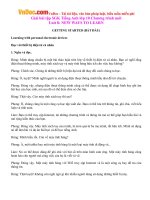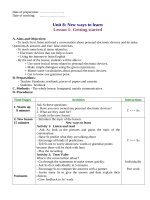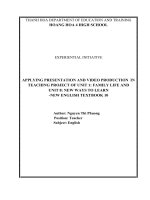Unit 08 New Ways to Learn Lesson 2 Language
Bạn đang xem bản rút gọn của tài liệu. Xem và tải ngay bản đầy đủ của tài liệu tại đây (5.12 MB, 22 trang )
Thursday, December 14st, 2017
UNIT 8
NEW WAYS TO LEARN
Class
10TA
They are people who use the modern
devices to learn.
GRAMMAR
RELATIVE CLAUSES
Read the following sentences and find
relative pronouns
1.They are the modern devices that
have changed the way we learn.
2.My laptop, which is a present from
my parents, is very useful.
3.A tablet is also perfect for people
whose work is to draw and write.
4.That man who came to fix the
internet access for me was skillful.
who
which
Relative
Pronouns
whose
that
Grammar
- My tablet, which is two years old,
still works quite well.
A relative clause is used
to modify the noun or
pronoun that stands
right before it .
- Sometimes we omit the wh-pronoun
or that.
Note:
The laptop whose cover is decorated
with funny animals belongs to my aunt.
Laptop
common noun
whose cover is decorated with funny animals
defining relative clause
Note:
Long , who is only two and a half,
likes to play games on a tablet.
Long
proper noun
who is only two and a half
non-defining relative clause
1. I talked to a man whose smartphone was
stolen.
2. The man turned out to be her son, who
had gone missing during the war.
Relative clauses are divided into two types:
• Defining relative clauses
• Non-defining relative clauses
Examples:
- I often use the desktop which my parents
Defining
bought me five years ago.
- This is my tablet, which uses the latest
Non-defining
digital technology.
What out!
- A defining relative clause gives detailed
and necessary information without which
the sentence is incomplete. It is not
placed between, or after comma(s).
Examples:
- The man who came to visit us is a
computer engineer.
- An e-book is an electronic book which
can be read on a mobile device.
What out!
A non-defining relative clause give extra
information without which the sentence
is still complete. It is placed between , or
after comma(s).
Example:
That man, who came to visit us, is a computer
engineer.
This is my brother, who is a computer engineer.
Non-defining relative clauses cannot use
the pronoun “that”.
Note
:
Demonstrative:
This, that,
these, those
Possessive: my, his, her,
their…
ThisProper
is my brother,
who
is
a
compute
noun: John, Hoa,
engineer
.
Obama…
Using who , which, that or whose to
complete each of the sentences.
1. Personal electronic devices which/that
_________
distract students from their class work are
banned in most schools.
2. The laptop _______
whose cover is decorated
with funny animals belongs to my aunt.
3. My tablet, ______
which is two years old, still
works quite well.
Using who , which, that or whose to
complete each of the sentences.
4. Students ________
who/that have smart phones can
use them to look up words in an electronic
devices.
5. Some scientists think that children ______
whose
parents allow them to use electronic devices
early will have more advantages in the
future. who
6. Long , ____ is only two and a half, likes to
play games on a tablet.
Call their names
1. J.K. Rowling, who wrote Harry Potter, is
one of the richest women in the world.
2. A customer is a person who buys
something from a shop.
3. I often use the desktop which my parents
bought me five years ago.
4. The man turned out to be her son, who
had gone missing during the war.
A
1. I talked to a man
2. We often visit our
grandfather in Vinh,
3. Thank you very
much for the book
4. The man turned
out to be her son,
5. He admires people
6. Have you heard of
John Atanasoff,
B
a. that you sent me.
b. whose invention
changed the world?
c. who are wealthy and
successful.
d. which is a city in
central Viet Nam
e. whose smartphone
was stolen.
f. who had gone
missing during the war.
KEY
1.e
2.d
3.a
4.f
5.c
6.b
Exercise
1. A building was destroyed in the
fire. It has now been rebuilt.
- A building was destroyed in the fire
which has now been rebuilt.
2. That computer technician served
us. He was very kind.
- That computer technician, who was
very kind served us.
man/who/help/me









